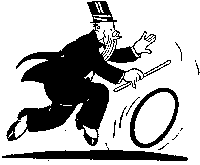And the big orange one keeps sinking.
Dear WD: Someone on television said recently that our local state senator had been “playing ducks and drakes” with the taxpayers’ money. I gather he meant our elected representative was less than fiscally prudent, but where do ducks and drakes come in? — Katherine Mercurio, New York City.
You know, I realized just the other day that I’ve always wanted a pet duck. Some of my fondest childhood memories are of feeding the ducks in the park on a Sunday afternoon. I’ve tried to train my cats to swim in circles and quack, but it’s just not the same.
 It pains me to subject noble waterfowl to even metaphorical association with politicians, but here goes. “Ducks and Drakes” is one name for a children’s game perhaps more popular in the days before television, when more children played outdoors. It’s also called “skipping stones,” and requires a pond or lake, a supply of small flat stones and a strong throwing arm. The object is to throw the stones at a low angle to the water’s surface so that they “skip” across the water, the more skips the better. In “ducks and drakes,” the first skip is called a duck, the next a drake, then duck, then drake and so on, “drake” being, of course, a male duck. The winner is the child who makes the most skips with one throw. The game itself is probably prehistoric in origin, and the name “ducks and drakes” dates back to at least the 16th century. It’s a pleasant child’s game, but clearly anyone who plays “ducks and drakes” with money is squandering it in the most pointless fashion imaginable — thus the metaphor, which is almost as old as the game.
It pains me to subject noble waterfowl to even metaphorical association with politicians, but here goes. “Ducks and Drakes” is one name for a children’s game perhaps more popular in the days before television, when more children played outdoors. It’s also called “skipping stones,” and requires a pond or lake, a supply of small flat stones and a strong throwing arm. The object is to throw the stones at a low angle to the water’s surface so that they “skip” across the water, the more skips the better. In “ducks and drakes,” the first skip is called a duck, the next a drake, then duck, then drake and so on, “drake” being, of course, a male duck. The winner is the child who makes the most skips with one throw. The game itself is probably prehistoric in origin, and the name “ducks and drakes” dates back to at least the 16th century. It’s a pleasant child’s game, but clearly anyone who plays “ducks and drakes” with money is squandering it in the most pointless fashion imaginable — thus the metaphor, which is almost as old as the game.
Speaking of ducks, our everyday speech contains many “ducks.” We “duck under” an awning to avoid a sudden shower or we “duck” an invitation to a boring party. These “ducks” come from the same root that gave the feathered duck its name, the Old English word “ducan,” meaning “to dive.” So when we shout “duck!”, we are not ordering anyone to waddle and quack, but warning them to dive to avoid harm.




Leave a Reply